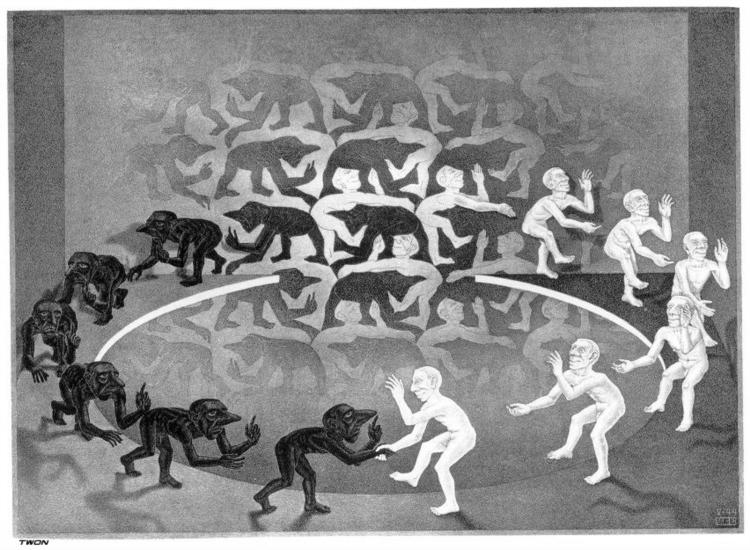
To find our niche, we must know ourselves.
- Knowing yourself is the beginning of all wisdom. [attributed to Aristotle]
- There are three Things extremely hard: Steel, a Diamond, and to know one’s self. [Benjamin Franklin]
- Everything that irritates us about others can lead us to an understanding of ourselves. [attributed to Carl Jung]
The intellectual component of finding one’s best niche in the world is self-knowledge. This includes knowledge of one’s strengths and weaknesses, along with one’s interests and dislikes, and how well one might fit into a field of endeavor.
“Understanding others is knowledge, understanding oneself is enlightenment”. Self-knowledge “represents not only one’s own standpoint but also the standpoint of others whose beliefs one is motivated to take into account.” “Two-year-old children are ready to understand others as intentional agents, but by age four, show the ability to read others’ minds skillfully enough to be able to look from others’ perspectives and understand that others can have beliefs different from their own . . .” “. . . compartmentalized individuals may experience difficulties in how they know the self, whereas individuals with integrative self-organization may display greater continuity and evaluative consistency across self-aspects, with easier access to evaluative self-knowledge.”
“Novel technological devices, applications, and algorithms can provide us with a vast amount of personal information about ourselves.” Medical researchers have identified several ways of gaining self-knowledge.
Real
True Narratives
Book narratives:
- Elton John, Me (Henry Holt and Company, 2019): “ . . . the man’s hard-won self-knowledge is what the book’s really about.”
- Elliot Page, Pageboy: A Memoir (Flatiron Books, 2023): “From Shame to Self-Acceptance, in Hollywood’s Glare”.
- Kari Ferrell, You’ll Never Believe Me: A Life of Lies, Second Tries, and Things I Should Only Tell My Therapist (St. Martin’s Press, 2025): “Ferrell herself did not know why she was driven to lie and steal, but she seems to have spent much of the next 15 years figuring it out.”
Technical and Analytical Readings
- Brie Gertler, Self-Knowledge (Routledge, 2010).
- Ursula Renz, ed., Self-Knowledge: A History (Oxford University Press, 2017).
- Quassim Cassam, Self-Knowledge for Humans (Oxford University Press, 2014).
- Dorit Bar-On, Speaking My Mind: Expression and Self-Knowledge (Oxford University Press, 2004).
- Anthony Hatzimoysis, ed., Self-Knowledge (Oxford University Press, 2011).
- Annalisa Coliva, The Self and Self-Knowledge (Oxford University Press, 2012).
- Annalisa Coliva, The Varieties of Self-Knowledge (Palgrave MacMillan, 2016).
Photographs
Documentary and Educational Films
Imaginary
Fictional Narratives
Poetry
The time will come / when, with elation / you will greet yourself arriving / at your own door, in your own mirror / and each will smile at the other's welcome,
and say, sit here. Eat. / You will love again the stranger who was your self. / Give wine. Give bread. Give back your heart / to itself, to the stranger who has loved you
all your life, whom you ignored / for another, who knows you by heart. / Take down the love letters from the bookshelf,
the photographs, the desperate notes, / peel your own image from the mirror. / Sit. Feast on your life.
[Derek Walcott, “Love After Love”]
That crazed girl improvising her music.
Her poetry, dancing upon the shore,
Her soul in division from itself
Climbing, falling She knew not where,
Hiding amid the cargo of a steamship,
Her knee-cap broken, that girl I declare
A beautiful lofty thing, or a thing
Heroically lost, heroically found.
No matter what disaster occurred
She stood in desperate music wound,
Wound, wound, and she made in her triumph
Where the bales and the baskets lay
No common intelligible sound
But sang, 'O sea-starved, hungry sea.'
[William Butler Yeats, “A Crazed Girl”]
Music: Composers, artists, and major works
Sometimes an artist captures himself in performance, as if to say “this is who I am.”
- Keith Jarrett, “My Song”, from the album of the same title
- Astor Piazzolla and the New Tango Quintet, “Tango: Zero Hour” (Neuvo Tango: Hora Zero) (1992) (46’): Piazzolla called this album his finest. It is a masterful display of the playful-seductive rhythms and sounds of the tango.
- Maxim Vengerov, “The Road I Travel” album
- Dave Burrell and David Murray, “In Concert” (1991) (51’) album: tracks include Punaluu Peter; Hope Scope; Gallad for the Black Man; Intuitively; Teardrops for Jimmy
- Dave Burrell, “Windward Passages” album (1979) (67’): drawn from Burrell’s life, this music is an ode to a young man coming of age.
- Laurence Dale, “Airs d’Opera” album (1988)
- Howard Alden, “Take Your Pick” album
Pianist Dollar Brand Xahuri (Abdullah Ibrahim) has offered several albums that express his view of himself and his heritage:
- “African Sketchbook” (1972) (47’)
- “Ancient Africa” (1973) (63’)
- “African Space Program” (1974) (43’)
- “The Children of Africa” (1976) (47’)
- “African Marketplace” (1979) (36’)
- “Echoes from Africa” (1979) (32’)
- “Africa – Tears and Laughter”
- “Ekaya” (Home) (1983)
- “African Magic” (2003) (55’)
- “African Herbs” (2021) (40’)
- Good news from Africa
- “African Piano” (2014) (39’)
- Party time – compilation of tracks
Albums:
- Hasaan Ibn Ali, “Retrospect in Retirement of Delay: The Solo Recordings” (2021) (152’): “Ali was prolific in his own sweet way when he sat down at the piano, as much on his choices of standards as on his spontaneous and previously-composed material”
Music: songs and other short pieces
Visual Arts
Film and Stage
- Vanya on 42nd Street, a “marvelously realized adaptation of a play about people wondering what they’ve done with their lives”, this play about “privileged, luxuriantly introspective characters” this adaptation “reduces Chekhov’s ‘Uncle Vanya’ to its bare elements: loneliness, wasted lives, romantic hope and despair”